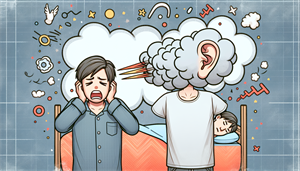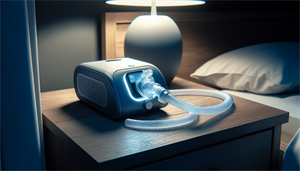Snoring, while often considered a harmless, albeit annoying, habit, can have more serious implications than you might think. Ever woke up with an unexplained pain in your ear? Well, your nightly orchestra could be the culprit! Let’s delve into the surprising connection between these nightly noises and ear discomfort, and explore the question: can snoring cause ear pain?
Key Takeaways
-
Snoring can result in ear pain, tinnitus, and even hearing loss due to high-frequency vibrations, pressure changes in the middle ear, and potential inflammation. These effects can manifest as dizziness, sensation of a blocked ear, and otitis media.
-
Individuals with sleep apnea, which can also cause snoring, are at a higher risk of hearing impairment related to blood hyperviscosity, intermittent hypoxemia, and oxidative stress, often requiring screening for hearing loss and treatment such as CPAP therapy.
-
Addressing snoring-related ear pain involves lifestyle modifications like weight loss and positional changes during sleep, medical interventions including CPAP therapy and surgery, home remedies such as nasal strips and humidifiers, and treating underlying causes to prevent recurrence.
The Link Between Snoring and Ear Pain

Snoring happens when airflow partially obstructs causing the throat’s soft tissues to vibrate. This seemingly harmless rumble can cause ear pain due to pressure changes in the middle ear coupled with potential inflammation.
So, how exactly does this manifest?
Loud Snoring Sounds
When the soft palate collapses during sleep, the snoring sounds reach high frequencies. These sounds can potentially lead to acoustic trauma in the auditory system, manifesting as tinnitus and ear pain. It’s not just about annoyance anymore, is it? To avoid such issues, it’s important to ensure the soft palate relax during sleep.
Snoring, especially from the bulky throat tissue at the tonsil and the tongue’s base, produces vibrations that can reach up to 1000 Hz frequencies. This high-frequency noise may cause hearing loss and hinder rapid speech comprehension. Now, that’s a wake-up call!
Pressure Changes
Snoring can have several effects on the ears, including:
-
Influencing middle ear pressure
-
Hindering fluid drainage
-
Resulting in pressure and pain
-
Manifesting as ear pain, dizziness, a sensation of a blocked ear, bleeding from the ears, and ringing in the ears
These symptoms are indicative of barotrauma resulting from the pressure changes caused by snoring.
If left unchecked, these pressure changes can lead to the following symptoms:
-
Aural fullness
-
Otalgia
-
Otitis media
-
Trigger additional infections
Hence, treating snoring and its root causes is necessary to mitigate these symptoms.
Inflammation
Lower-level obstruction primarily attributes to snoring-induced inflammation, which results in inflammation and oxidative stress. Habitual snoring can contribute to inflammation in the ear by causing recurrent otitis media and potentially necessitating the placement of tympanostomy tubes.
If you’ve been noticing discomfort when tugging on the earlobe or moving the head, a yellowish discharge from the ear, or sensitivity within the ear, it might be indicative of inflammation in the ear. This is a sure sign that it’s time to take your snoring seriously!
Sleep Apnea and Ear Health

Those with sleep apnea are 21% more likely to experience hearing impairment. The potential pathways that might lead to auditory dysfunction due to sleep apnea include:
-
Blood hyperviscosity
-
Intermittent hypoxemia
-
Oxidative stress
-
Changes in sympathetic tone
These factors can contribute to hearing problems in individuals with sleep apnea.
Let’s explore how sleep apnea influences our ear health.
Hearing Loss
Sleep apnea can diminish blood flow to the ears due to inflammation in the body, which may lead to harm to the inner ear structures involved in hearing. Prolonged exposure to loud snoring can lead to sensorineural hearing loss as it can damage the delicate hair cells in the ears.
Individuals with severe obstructive sleep apnea and the lowest oxygen levels were found to have a higher likelihood of experiencing hearing impairment, according to a recent study. This suggests a potential link between sleep apnea and hearing issues. Consequently, all sleep apnea patients must undergo hearing loss screening.
Eustachian Tube Dysfunction
Sleep apnea may result in Eustachian tube dysfunction, which could cause potential ear pain and discomfort. Severe obstructive sleep apnea syndrome can lead to upper airway resistance, which may result in Eustachian tube dysfunction and negative pressure changes in the middle ear.
Long-term CPAP therapy has the potential to:
-
Normalize middle ear pressure
-
Eliminate the upper airway resistance linked to obstructive sleep apnea
-
Provide effective treatment for the associated Eustachian tube dysfunction
This offers a ray of hope for those grappling with sleep apnea and subsequent ear pain.
How to Alleviate Ear Pain Caused by Snoring

Constant ear pain due to snoring might sound disheartening, but don’t lose heart. There exist multiple ways to relieve the discomfort, from lifestyle modifications and medical treatments to home remedies.
Let’s explore these solutions.
Lifestyle Changes
Weight loss can help reduce snoring and the associated ear pain risk by decreasing the upper airway’s fatty tissue and enhancing throat muscle tone. Lying flat can obstruct nasal passages, leading to snoring, while sleeping on one’s back can exacerbate snoring and airway collapse. Thus, sleeping on the side is generally recommended to alleviate both snoring and ear pain.
Abstaining from alcohol is beneficial for reducing snoring due to its muscle-relaxing effects on the throat, which can elevate the likelihood of snoring and subsequently contribute to snoring-related ear discomfort. Simple changes in your lifestyle can make a significant difference to your ear health and overall well-being!
Medical Interventions

CPAP therapy, used to treat sleep apnea, maintains the airway open, preventing snoring-causing muscle collapse, and potentially relieving ear pain associated with snoring. In addition, surgical interventions such as uvulopalatopharyngoplasty (UPPP), septoplasty, turbinate reduction, and coblation palatoplasty may also be recommended by healthcare professionals. Each treatment comes with potential side effects, which may include excessive salivation, dry mouth, jaw pain, facial discomfort, and other minor subjective side effects from devices like mandibular advancement devices, as well as pain, soreness, infection, and physical discomfort from surgical procedures.
Before deciding, discuss these options and their potential effects with your healthcare provider.
Home Remedies
Nasal strips work by using small springs embedded in the strips to keep the nostrils open, thereby enlarging the nostrils, reducing resistance, and improving airflow. This can alleviate snoring and associated ear pain by improving breathing through the nasal passages.
A humidifier helps by moisturizing the air, which in turn alleviates:
-
dryness in the nasal passages and throat
-
breathing difficulties
-
snoring
-
symptoms of sinusitis such as a stuffy nose and dry throat, which are associated with ear pain.
These simple home remedies can provide relief and improve your quality of deep sleep, ensuring a good night’s sleep.
When to See a Doctor

If one has been experiencing snoring for a long time, and ear discomfort persists despite trying pain relief medication and rest, they should consider scheduling an appointment with a doctor. Leaving persistent ear pain from snoring untreated can result in repeated ear inflammation and temporary hearing loss.
If snoring occurs and is accompanied by additional concerning symptoms such as:
-
excessive daytime sleepiness
-
morning headaches
-
gasping for air during sleep
-
persistent noisy breathing even when not congested
It is considered an emergency.
Preventing Snoring-Related Ear Pain
Preventing is always preferable to curing, especially true for snoring-related ear pain. It’s vital to address snoring’s underlying causes as it focuses on the problem’s main source, thereby preventing ear pain.
For example, alleviating allergy and sinus symptoms or treating nasal congestion can decrease the likelihood of snoring, thus reducing the risk of ear pain.
Sleep Hygiene
Establishing a comfortable sleep environment can aid in preventing snoring and potentially reducing related ear pain. Here are some tips:
-
Sleep on your side
-
Use a nasal strip or mouthpiece
-
Utilize an anti-snore pillow to elevate your head
-
Address nasal congestion
-
Maintain a healthy weight
Maintaining a consistent sleep schedule is essential to prevent snoring since irregular sleep patterns may affect sleep quality and lead to snoring. A regular routine helps minimize sleep disruptions and potential sleep deprivation, which can overly relax throat muscles and result in snoring that may lead to ear discomfort.
Treating Underlying Causes
A continuous positive airway pressure (CPAP) device can effectively treat snoring associated with obstructive sleep apnea. In addition, medical treatments such as:
-
steroid nasal sprays
-
nasal decongestants
-
antihistamines
-
various surgical procedures like uvulectomy, nasal reconstruction, adenotonsillectomy, and palatal implants
May also be recommended by healthcare professionals for those at risk of heart disease.
To manage allergies that lead to snoring, individuals can avoid known allergens, use nasal sprays or antihistamines, and keep the bedroom environment clean from dust and other allergenic particles which can alleviate snoring caused by allergic rhinitis and nasal congestion.
Summary
Snoring, often dismissed as a mere annoyance, can indeed cause ear pain and discomfort. Understanding the relationship between snoring and ear pain, and being aware of the potential risks such as hearing loss and Eustachian tube dysfunction, is essential. By implementing lifestyle changes, seeking medical interventions and utilizing home remedies, you can alleviate the discomfort and improve your quality of life. Remember, don’t hesitate to consult a doctor if your ear pain persists or worsens. Your ears deserve your care!
Frequently Asked Questions
Can snoring make your ear hurt?
Yes, snoring can cause hearing damage, as sounds of over 85 decibels have the potential to damage hearing, making it a cause for concern.
Can sleep apnea cause ear pressure?
Severe obstructive sleep apnea syndrome may increase middle ear pressure, but long-term continuous positive airway pressure therapy can normalize it.
Can snoring cause tinnitus?
Yes, frequent snoring at high frequencies can cause noise-related hearing loss, which can result in tinnitus, impacting quality of sleep and daily life.
Can allergies cause ear pain and sore throat?
Yes, allergies can cause ear pain due to increased sinus pressure, which can result in earaches and short-term hearing loss, as well as a sore throat from postnasal drip.
What lifestyle changes can help alleviate ear pain caused by snoring?
Making lifestyle changes such as weight loss, breathing through your nose, avoiding alcohol before bed, and sleeping on your side can help alleviate ear pain caused by snoring.


